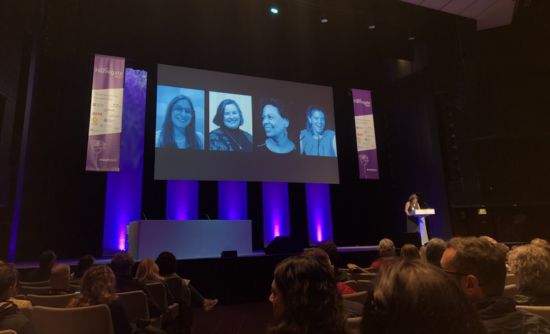I arrived at Harrogate station feeling contemplative and eager to experience my first IATEFL conference. The view from the train into the North Yorkshire, England town of Harrogate is idyllic – rolling hills dotted with stone walls and the occasional cow – and certainly inspires contemplation.
Having just attended the International TESOL Convention in Portland, Oregon in the U.S. at the end of March, I was curious how IATEFL 2023 would compare.
I wondered to what extent people would be talking about generative artificial intelligence (AI) – the infamous ChatGPT – and whether the residual effects of a global pandemic would still be detectable. I hoped to hear about innovation in assessment, workplace English, and English for Specific Purposes.
Having never visited Harrogate, it’s hard to say if the city typically feels vibrant or if the IATEFL conference had something to do with it, but there was definitely an energy in the air.
Walking through green spaces scattered across the city cleared the way for inspiration that would follow; attendees arrived at the convention center bright-eyed and bushy-tailed, ready to take IATEFL 2023 by storm.
What was made immediately clear upon entering the conference center is that IATEFL is a place to gather, a place for old friends and colleagues to connect and catch up, as evidenced by the seemingly never-ending enthusiastic greetings and hugs.
Read about participants and trends at last year’s IATELF Conference.
Setting the tone: Plenary speeches

Plenary speeches serve an important role at any conference; they raise questions for consideration and ultimately set the stage for fruitful discussions between attendees. The plenaries at IATEFL 2023 did just that.
The placement and upward spiral design of the auditorium at the Harrogate Convention Centre made attendees feel like they were ascending to a space of heightened wisdom.
| Tuesday, April 18: Opening Plenary | English for the workplace – looking for new answers | Evan Frendo |
| Wednesday, April 19 | Lean on me: stories of coaching, mentoring, and teacher resilience | Divya Madhavan |
| Thursday, April 20 | Sharing words and worlds: ESOL teachers as allies, advocates, and activists | Lesley Painter-Farrell |
| Friday, April 21 | Translanguaging and teaching English as a foreign language | Ofelia García |
| Friday, April 21: Closing Plenary | Race, popular culture, and ESL in a post-George Floyd moment | Awad Ibrahim |
In the opening plenary, Evan Frendo encouraged attendees to think differently to find new answers to help individuals enhance their English communication skills in the workplace. By exploring insights from various researchers, ELT professionals, and stakeholders, including decision-makers and language learners in multinational companies, he argued that we can adapt to the evolving needs of the international workplace.
On Wednesday, Divya Madhavan discussed that as educators of the world’s international language, we understand the importance of fostering communication for understanding and acceptance. By featuring collaborators’ voices, she showcased stories of resilient teachers and the transformative power of mentoring and coaching practices in building stronger relationships and self-perception within an ELT context and beyond.
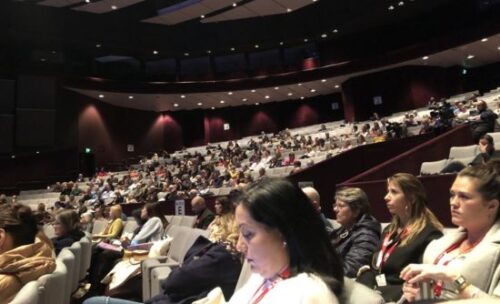
In Thursday’s plenary, Lesley Painter-Farrell examined the various roles of ESOL teachers and how a multimodal approach – incorporating cultural responsiveness, restorative practices, and asset-based, international-minded curricula – can better prepare and support us in meeting the linguistic, social, and emotional needs of our learners.
In her plenary on Friday morning, Ofelia Garcia posited that translanguaging theory offers a new perspective on the English language, impacting our understanding of how EFL students become bilingual in different sociocultural contexts. The case studies she presented demonstrated how instructional design changes when adopting a translanguaging approach – promoting sociocultural consciousness and recognizing the historical connections between English, colonialism, and globalization – within local contexts. Opening translanguaging spaces in EFL instruction allows students to engage with English while preserving their identities, knowledge systems, and cultural practices, leading to increased engagement in English learning.
In a moving closing plenary, Awad Ibrahim explored the concept of race as a language, highlighting its structural components and arguing that it influences us as much as we influence it. He encouraged us not only to consider how our words and actions have created systems of oppression but ultimately shaped how black people are viewed in this country. “Blackness has always been multiple,” he said.
The plenaries, while incredibly different in content and speakers’ backgrounds, were grounded in the same mission: to inspire ELT stakeholders in attendance to broaden their perspectives and consider other ways to understand the people we work with and the impact of our work.
I couldn’t help but notice how each of the plenary speakers acknowledged advocacy: advocacy for teacher well-being, advocacy for populations placed at risk, and advocacy for equitable English language teaching. As Madhavan stated in her closing remarks, “Courage is speaking up, and acting up when necessary.”
Prominent themes and session spotlights
Ideas about workforce language instruction and its overlap with English for Specific Purposes, advocacy as a pillar of ELT, and teacher well-being were certainly recurring themes at IATEFL 2023. There were also other note-worthy threads.
Embracing the silver lining of a global pandemic
Despite the lingering effects of the COVID-19 pandemic on international enrollment and individual well-being, it seemed that everyone I spoke to had some kind of positive takeaway from the pandemic.
A university-based educator from Amsterdam I spoke with mentioned using the pandemic lull “to breathe and reevaluate priorities.” Others mentioned feeling frustrated about the need to pause for a period but ultimately found that the “forced break” allowed for critical restructuring of processes that would lead to increased efficiency later on.
Perhaps most prominent was the idea that the pandemic forced ELT professionals to innovate in ways that they hadn’t imagined possible.
The 56th annual IATEFL conference was the second fully in-person conference put on by the organization since the start of the pandemic. Last year, Bridge journalist Gerald Smith cited the noticeable enthusiasm present at the IATEFL 2022 conference.
While the novelty of in-person events post-pandemic has perhaps started to wane, the enthusiasm for collaborating with international colleagues remains.
Katie Callahan Naginsky, Founder of the International Women’s Resource Center, a nonprofit organization based in Los Angeles, California in the U.S., reflected on her experience as a first-time attendee. “I’ve found it very engaging, and I’m really excited about the contacts I’ve made and projects I hope to collaborate on with people who I’ve met here.”
Barbara Craig, an Australian researcher examining teacher leadership, shared a similar excitement around making new friends at IATEFL this year, having attended the conference last in 2019. “The pandemic came and our borders had been closed for a long time,” she said. “I’m enjoying being able to present my research and hear about what everybody else is doing … the myriad ways that English is being taught around the world to many varied learners with different needs.”
Read about how ELT associations proved instrumental in supporting constituents through the pandemic.
Increased CPD efficacy
Many attendees I spoke with expressed a desire to “do better” for their constituents, and such desire was made apparent by the multitude of sessions around the efficacy of continuing professional development (CPD).
In his session entitled “Meaningful and impactful training? Evaluating self-directed PD,”
Neil Ainsworth, a Senior Teacher Trainer at Oxford University Press, reminded us that meaningful and impactful professional development can lead to augmented motivation and job satisfaction, and of course, higher quality teaching. But the process of measuring professional development effectiveness leaves room for improvement.
Ainsworth proposes that participants use a framework to evaluate their professional development that comprises elements of the Kirkpatrick Model and Guskey’s Critical Levels of PD. This reflective process entails examining teacher beliefs, reflecting on implementation of PD content into one’s practice, as well as examining the impact incorporated changes have on student performance.
Learn more about trends and opportunities for upskilling in ELT.
Hybrid approaches to professional development
In line with the overarching theme of extracting the positive from a challenging period, many CPD sessions explored how increased hybridity can support teachers in their professional development journeys.
Another Oxford University Press session titled “Choose Your Own PD Adventure” asked attendees to begin with their purpose in pursuing PD, and only from there, a place of understanding needs and logistics surrounding PD, begin to field existing PD options. Aptly named, presenters encouraged attendees to think of PD as an adventure in which we have the opportunity to guide ourselves. Proponents of reflective pedagogy appreciated the personalized approach to PD and the inclusion of visual tools to guide thinking around the topic.
In his interactive talk, “Teacher Reactions to Online Lesson Feedback,” Dr. David Bish, Head of Academic Affairs at English First Teach Online, highlights the incredible opportunity that exists within online lesson observation protocol.
Drawing from experience working with over 2,000 teachers within the EF Teach Online division, Bish shared how a reflective model for teacher observations – observe, communicate, improve – trumps a policing model consisting only of observation and reporting.
Like Bish, many presenters asked attendees to think about how online professional development could support them in ways previously deemed unfathomable. Some cited social media as avenues for deep learning, rather than supplemental add-ons, as previously thought.
The panel, “Forum on Online CPD,” brought together researchers and teacher trainers from different contexts to examine just that.
As a part of the forum, Cecilia Nobre of the University of Warwick, gave a talk titled “Using social media as a powerful CPD tool for trainers,” which offered strategies to take advantage of social networks and tools for professional growth. She cited teacher communities on Facebook, including the British Council Teacher Community, and emphasized how LinkedIn can be a tool not only for connecting but also for engaging in meaningful dialogue with other educators. “Comments are fertile ground for insights,” Nobre said.
Most industry professionals are aware of the advantages of using LinkedIn, either for networking purposes or pursuing additional credentials, but perusing comments on posts may not be traditionally thought of as a form of CPD. Nods of appreciation at the idea served as a telltale sign that members of the audience were reconsidering their own LinkedIn usage.
Anna Bartosik of George Brown College contributed to the forum with a segment titled “Teacher development in digital spaces: the future or an exception?” Primarily, Bartosik shared ideas derived from her dissertation work on using Twitter for CPD.
In sharing research strategy, Bartosik also demonstrated to attendees ways they could get the most out of Twitter as a PD outlet, including involvement in Twitter chats (#CdnELTchat and #SIGtweetmeet) and strategically following other users to refine their professional learning network. Bartosik asked a question that resonated with the audience: “Why can’t time on Twitter count for PD hours?”
In addition to offering a myriad of sessions reimagining the face of CPD in the new professional learning landscape, thought leaders at IATEFL led by example.
The plenary speeches on both Wednesday and Thursday included asynchronous elements, in which presenters incorporated the voices of colleagues who weren’t physically present in the form of pre-recorded conversations.
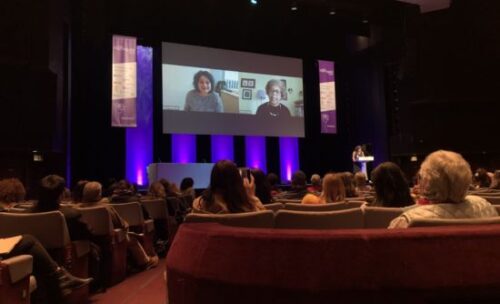
Personally, I really appreciated how plenary speakers were willing (and seemingly eager!) to share the stage with colleagues, reinforcing the collaborative spirit of the conference.
Low-tech CPD solutions
Another prominent angle was that of CPD in low-tech or limited-resource contexts. There were several sessions that explored how CPD might be delivered when internet bandwidth can’t accommodate a synchronous Zoom or Teams meeting.
Among the most prevalent asynchronous (or low-bandwidth) alternatives included popular messaging apps WhatsApp and Telegram.
The final contributors to the “Forum on Online CPD” mentioned above were Joanna Newton of the British Council, South Africa, and Siphatisiwe Patricia Ndlovu, from DBE Eastern Cape South Africa. Together, they presented “Using Telegram to Support Teachers,” which examined how they not only use Telegram to field teachers’ needs in terms of workshop topics but disseminate nearly all of their content on the application. Teachers participate in workshops live, and organizers post workshop content “one slide at a time” in the Telegram group.
In addition to supporting teachers all over the country asynchronously, they offer live mentoring sessions once a week and meet one day in person per term “to focus on key deliverables and develop relationships.”
Presenters shared how this hybrid approach is effective in rural South Africa, noting advantages such as increased contact time with teachers, increased transparency in training progress by stakeholders, and an increased opportunity for reflection in between sessions. “Overall, this results in more efficient, responsible, inclusive (and cheaper) teacher support,” Newton concluded.
Along the same vein, Anna Young and Kristina Smith, both of Bell Educational Services, delivered a talk titled “Adventures in WhatsApp: teacher training in low-resource centres.” Focused on their experience delivering an eight-week course aimed at improving teacher target language fluency for English language high school teachers in Guinea.
Young and Smith emphasized the importance of “medium-friendly” content delivered in bite-size portions. They share that they experimented with having set content associated with days of the week; Pronunciation Friday, for example, might examine weak forms and schwa, or syllables and word stress.
Like the Telegram-centric teacher development happening in South Africa, Young and Smith offered live elements to support learning happening on WhatsApp. They also emphasized the teamwork that goes into sustaining this practice. There are several WhatsApp groups to support participants from different regions, and there are TAs who aid in the real-time facilitation, along with monitoring participant activity and participation.
Whether you choose to facilitate CPD via Telegram or WhatsApp, presenters in the aforementioned sessions provided similar recommendations to audience members. In order for this to be successful, you have to know the resources available in the contexts you are working in; there need to be clear instructions and models for any activities participants are being asked to fulfill; and engagement doesn’t end with engaging material – rapport-building is a critical piece of sustained and meaningful app-centric CPD.
It was clear that audience members not only appreciated the wisdom imparted by presenters but were also impressed by the innovation on the part of the organizers. A teacher from Cameroon sitting next to me remarked that the presenters had “really figured it out.”
Read about ways to boost your resume with professional development for ESL teachers.
Maximizing return for stakeholders
As is the case amidst any gathering of overworked educators, priority was placed on saving time and maximizing returns on investment. Several sessions I attended focused on reimagining programming to maximize returns for stakeholders.
In a talk titled, “Developing teacher cognition: Maximising the impact of in-service CPD programmes,” Ben Beaumont of Trinity College explored how analyzing and adapting publisher-created materials can serve as an opportunity for professional development. Beaumont posits that material development in an ongoing way can be much more effective than one-off PD offerings, particularly when paired with reflection and application.
Bridge Education Group demonstrated its commitment to CPD with two well-attended presentations.
Bridge Teacher and Institutional Relations Manager, Maggie de Oliveira, presented on “Best practices for online course delivery: engaging and supporting learners.” In her talk, she explored how rapid growth of online learning expedited the development of online offerings. Now that we know online learning is here to stay, it’s high time to revisit processes and offer suites to best serve the needs of our target audience.
She made the case that an eLearner’s experience is much larger than just participating in the course. From the individual’s independent research to inquiring about courses and advisement to enrollment and accessing the learning platform for the first time, providers of eLearning need to be thinking about learner experience. And then, of course, comes the instructional design piece, for which de Oliveira shared a few concrete considerations for supporting the eLearner: online presence, feedback, and communication.
Accessibility was definitely an important consideration across the conference program, as was inclusivity.
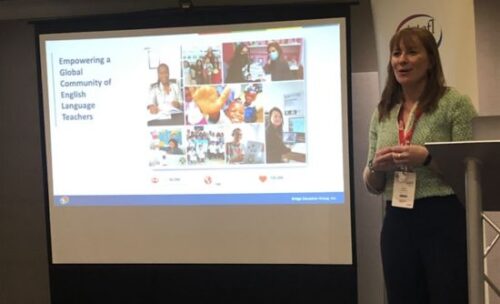
Celebrating World Englishes
There was a lot of conversation around embracing (and as needed, providing a platform for) all versions of English, often referred to as World Englishes.
Bridge’s Director of Operations, Anna Hearrell, in collaboration with Venice Irving, CEO of Happy Teachers, presented a talk titled “Teaching English as a global language: Changing mindsets through culture.” They posited that culturally-responsive teaching (and more generally, integrating culture into instruction) has the power to shape student perspectives and broaden cultural awareness, eliminate biases and prejudices in the workforce, and empower English teachers on a global scale.
In an engaging session, Hearrell and Irving explored how to integrate materials and activities in the English classroom that honor the linguistic and cultural nuances present in the English language. Attendees buzzed with ideas for becoming more culturally-responsive educators.
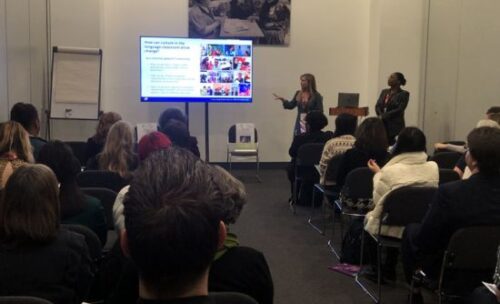
After the conclusion of the session, which touched upon some of the hardships that Jamaican teachers of English face, including discrimination during the job search, Irving shared some reflections with me.
“People think because we’re from Jamaica, or because we’re from the Caribbean, our English is not the standard English,” she said. Irving flagged the importance of acknowledging and combating native speakerism, which stems from colonialization. She recalls a time when the principal of a school she was teaching at in Taiwan asked her to tell her students’ parents that she was from America and speak with an American accent.
Following this encounter, Irving asked herself, “Do I go along with this or do I follow that gut instinct that I have where I feel like I need my voice to be heard, my true voice, and I need my identity to be respected? I’m not American, I’m Jamaican. I’ve been to America twice in my life.”
As shocking as Irving’s anecdote may seem, interactions such as this are commonplace for teachers who don’t hail from “the inner circle.”
“This is all about the decolonization of English, letting people know that not only people from Australia, New Zealand, America, Canada, and the UK speak English. But you have varieties of English that people need to learn because when they go out into the world, they will interact with everyone, right?”
Interested in additional training? Learn about Bridge’s Teaching English as a Global Language Micro-credential course.
Decolonizing ELT
The question of how to effectively decolonize ELT was on the minds of many. As Madhavan said in her plenary address, “There needs to be a way to decolonize education that really is accepting of others.”
Irving, of Happy Teachers Jamaica, was thrilled that there was a lot of talk about decolonizing the teaching of English, partially because she’s currently pursuing doctoral studies related to this movement at the University of Manchester. She believes that there is still a lot of work to be done, and that begins with asking questions about the “genesis of prejudice and discrimination of teachers who don’t come from those inner circle countries: Where is it coming from? How can we start to break down those walls?”
Neginsky, of the International Women’s Resource Center, having recently attended the International TESOL Convention in Portland, Oregon in the U.S., was able to draw parallels between themes present at both gatherings. “The context in which the instructors here are teaching differs a lot from those attending conferences in the U.S., but a lot of themes are shared – like decolonizing ELT– and it shows there is progress happening in the same areas.”
Translanguaging theory, a necessary inclusion in any conversation about decolonizing the English language classroom, refers to the use of all available linguistic and cognitive resources, including those present in learners’ home languages, and offers educators an alternative framework when working with language learners.
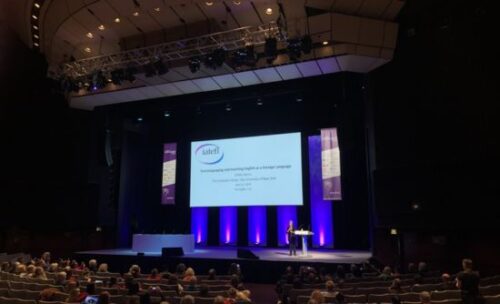
In her plenary, Ofelia Garcia examined how bilingualism and multilingualism can be viewed through the lens of translanguaging.
She encouraged listeners to consider what it means when a learner is an emergent bilingual, simultaneously learning a language spoken at home and one at school. She also advocates that assessing the progress of these individuals requires a shift away from the deficit framework that is typically used in a language learning environment to one that doesn’t require students to shed identities, knowledge systems, and cultural and linguistic practices.
The implications of translanguaging within an English-learning environment, however, remain a bit nebulous. While teachers recognize the importance of ensuring multilingual learners feel valued in the classroom, the “how” remains a point of contention. Opponents struggle to see how a monolingual teacher can support students who are translanguaging without understanding how grammar works in the students’ home language.
Despite logistical questions, there is no doubt that teachers are willing to engage in reflective pedagogy to support their learners.
Learners’ needs are front and center with industry developments
In addition to the nuggets of gold gleaned from the concurrent sessions and subsequent conversations between attendees, there are a few note-worthy developments that I had a chance to learn more about at IATEFL 2023.
The forthcoming launch of a new streamlined version of the TOEFL iBT
After the conference, I had a chance to chat with Srikant Gopal, Executive Director of the TOEFL Program at ETS, and learn about key differentiating factors between the current version of the TOEFL iBT and the version launching on July 26, 2023.
“The TOEFL iBT test will now take less than two hours to complete,” said Gopal. This was achieved through four main changes.
First, the streamlining of instructions and navigation “allows test-takers to focus more time on the questions being asked and less time reading through the upfront material.”
Second, there’s the removal of all unscored test questions, which were previously “used as part of our statistical analyses to ensure that questions are fair, valid, and unbiased. As we’ve looked into opportunities to enhance the test-taker experience, we’ve identified ways to gather the data we need via post-administration analyses, without compromising the validity of scores or the amount of time it takes to deliver them.”
Third, test-takers can also expect a shortened reading section, as one passage and associated questions have been removed. “The section will continue to be a rigorous measure of one’s reading abilities and the types of tasks within the section remain the same,” promised Gopal.
Fourth, and lastly, there is the introduction of a new writing task, called Writing for an Academic Discussion task, which replaces the Independent Writing task. Within this task, test-takers will be expected to write a post within an online forum with their opinion on a specific topic. “The task is a more modern representation of tasks that students may replicate in a university setting, such as engaging in a discussion board,” said Gopal.
Gopal shared that in addition to shortening the test, they’ve also made the registration process more seamless and enhanced score transparency. Students will now be able to see their official score release date upon completion of the test, along with real-time notifications about changes to their score status on the ETS website.
When I asked Gopal what motivated ETS to make these alterations, he spoke of striking a balance between what customers want and need. “Test-takers want an optimal experience, and institutions/score users need a reliable measure of English-language proficiency. We’re able to do both via these enhancements, and we continue to look at ways to innovate our offerings.”
You can read more about the changes in their recent press release and gain more insight into enhancements and resources for students and teachers on the enhancement website.
Interested in teaching test prep? Read about eight tips for teaching English test preparation.
The Future of English: Global Perspectives
British Council’s recent publication, The Future of English: Global Perspectives, garnered a lot of attention. During the British Council Signature Event, Researcher and Lead Presenter Mina Patel shared how she and her research team are “initiating change in response to the needs of learners” with their research program, The Future of English.
In summary, the publication (and associated research) examines the future of English as lingua franca, calling into question whether this reality will shift in the coming years with the emergence of digital innovations, revolutionized thinking about indigenous languages, and other current trends.
In the Signature Event, other members of the research team read excerpts from the publication, The Future of English: Global Perspectives, which represents phase two of a three-part research project.
The Future of English research program has three main objectives:
- Uncover trends that will shape the role of English as a global language in the future.
- Influence language policies and educational reforms based on the insights gained.
- Establish a research agenda that generates evidence and data to inform policy decisions and assess their effects.
It builds upon David Graddol’s influential works, The Future of English (1997) and English Next (2006), which identified key trends for the English language. The project, initiated in 2020 after Mike Solly’s presentation on Graddol’s hypotheses, aims to further evaluate and explore these trends.
Through global roundtable discussions, the book provides insights into the use of English for social, educational, and professional purposes. It serves as a crucial resource for English language education, emphasizing the importance of ongoing research in this ever-changing field.
Questions that emerged from the roundtables can be examined below.

Why attend IATEFL?
Speaking with attendees (first-timers like myself or seasoned conference goers, from the UK or hailing from distant lands) there was certainly a shared sentiment – IATEFL feels like coming home.
There are so many reasons to attend the IATEFL conference, but here’s what came up the most when I asked people for their key drivers:
IATEFL gives you a chance to connect with international colleagues and fellow changemakers.
“IATEFL 2023 in Harrogate was a vibrant and exciting event!” said Hearrell. “I could tell that everyone attending was ready to connect and innovate, helping to drive change in our industry. I enjoyed meeting teachers, administrators, consultants, and teacherpreneurs from various backgrounds who were all ready to network and learn.”
Irving noted that she felt inspired to see that teachers in different contexts face similar challenges, particularly with regard to low-income countries obtaining resources for their students. “I was very interested to hear their challenges and how they are overcoming those challenges.”
Nearly everyone I spoke with acknowledged how special it is to learn from international colleagues.
IATEFL 2023 drew 2,000 attendees from 110 countries. Attendees included individuals from all sectors of the industry: teachers, teacher trainers and CPD providers, program administrators, researchers, and individuals who work in publishing and assessment, among others (IATEFL Harrogate 2023 Attendee Statistics).
“We are very happy with the overall turnout for the conference and are pleased to see our numbers increase from last year in Belfast. Although we are not back to pre-pandemic numbers, we are seeing an improvement,” said Annie Park, IATEFL Exhibition and Sponsorship Officer.
“Attending IATEFL is a great opportunity to network, exchange ideas, and pick up new trends in ELT,” remarked Christian Berlin, Head of the Language Department at De Vinci Higher Education in Paris, France, and second-time IATEFL conference attendee. “The conference was great, better than last year, or perhaps I was better in selecting the talks.”
Berlin said he noticed a lot of conversation about ChaptGPT and machine translation, more specifically how teachers can “cope” with the advancements we’re seeing. Predictably, the emergence of generative artificial intelligence (AI) and its implications on teaching and learning was a hot-button topic. While several sessions I attended acknowledged this advancement, the submission for session proposals preceded the release of ChatGPT, so I noted only a few sessions dedicated specifically to AI, primarily focused on how educators can work alongside AI to improve current pedagogical practices. I expect that next year’s conference will showcase innovative approaches ELT stakeholders have taken to harness the power of AI and machine learning.
With approximately 500 concurrent talks, workshops, and forums over a four-day program, it’s safe to say there is something for everyone.
Craig shared that she had been thinking about creating a podcast for a while and that a session she attended gave her “some courage to go back to that idea and reexamine it with a fresh energy.” She also shared her excitement about how sessions connected to her research pursuits on women in ELT leadership roles. “They interviewed the previous four presidents, tracing their journeys and how they’d gotten into leadership, and sharing their tips for women in leadership. It was really quite insightful.”
The resources exhibition was also top-notch, boasting over 50 ELT-related exhibitors. A teacher I met from Italy said he really looked forward to sipping his coffee and chatting with people in the exhibition hall, saying, “It’s a great way to learn what to pay attention to.” According to the Attendee Statistics report, 92 percent of delegates visited the Exhibition Hall.
Another thing that makes the IATEFL Conference unique is the ample opportunity to socialize for the sake of socializing. One key difference that I noted between IATEFL and the TESOL International Convention is how social events are numerous and highly encouraged. This year, Pecha Kucha and Music Night were crowd favorites at IATEFL. “One should also try to attend the open-bar events hosted by the big sponsors,” Berlin said with a smile.
Perhaps the best way to sum up why one should attend IATEFL is a quote from Ibrahim’s closing plenary: “The more conscious, the more aware we are, the better we will be.”
IATEFL helps us become more conscious and aware users and teachers of the English language, bettering not only the lives of our students but the future of our collective society.





